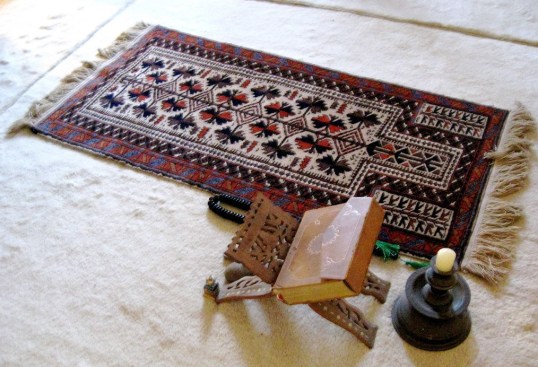 Salah and its affect on our faith Salah i.e. the five times prayers in Islam, is the most important act of a believer’s life and a major source of strengthening our faith, which if missing, puts a question mark on our faith. Salah is the essential part of our faith as stressed right in the beginning of the Quran: “Who have Imaan (faith) in the al-ghayb (unseen), establish salah (5 times prayer), and spend out of what We have provided for them.”[1] Allah ﷻ also mentions how salah protects oneself from bad habits and behavior: “be constant in salah (5 times prayer): for salah restrains outrageous and unacceptable behavior.”[2] Since bad habits and behavior leads one towards the path of kufr (disbelief) hence it in the light of this understanding why Prophet Muhammad ﷺ said "Between disbelief (Kufr) and faith (iman) is abandoning the Salah."[3] Abandoning salah makes us prone to committing disobedience towards Allah ﷻ. Its very important to understand that just like how our bodies require physical sustenance to survive, similarly, our ruh[4] (spirit or upper soul) requires its sustenance. Our bodies are formed inside our mother’s womb and its creation belongs to earth, therefore the food that sustains it comes from the earth such as meat, vegetables, fruits, water etc. available on earth that sustains our bodies and provide them energies required to live healthy. Any deficiencies of these elements causes our bodies to suffer weakness. Maulana Tariq Jameel, a leading Pakistani Islamic scholar, preacher and public speaker teaches that since the ruh (spirit) was brought down from the heavens by an angel and placed in to our bodies, which gives life to a mother’s womb, therefore, the sustenance of the ruh lies in the heavens and not on earth. One of the major acts of spirituality in Islam is the obligatory salah (5 times prayers), it is one of the major sources of food and water for the ruh. The salah comprises of three main things: zikr (praising & remembrances), qirat (recitation) of Allah’s divine words from Quran and duas (supplications & invocations). Once we do these things five times a day with full concentration towards our Creator, we form a spiritual connection that is supposed to strengthen our souls and gradually increase faith in our hearts. It is due to this reason the Prophet ﷺ said in one of his hadith that: “As salatu mi’raajul mu’mineen” which means “that in salah there is the ascension for the believers”[5]. Miraaj (ascension) is the journey that Prophet Muhammad ﷺ undertook to the heavens and came closest to Allah ﷻ. Even though it is considered as a very dhaeef (weak) hadith in respects of its category, yet few but great Islamic scholars have chosen to mention in their works due to the fact that it brings out a very important meaning for the act of salah for a believer. Any sort of loss experienced when we miss one or more of our daily salahs or abandon them altogether causes our inner self to experience gloominess and sadness. This is indeed mercy indicating one to turn back to Allah ﷻ so that you may continue to keep our souls energized. Keeping them energized through salah and zikr keeps us spiritually strong and gives us the courage to face whatever difficulties we experience. Once our bodies experience death, our energized souls survive in the world of barzakh (intermediary stage between death and resurrection) before the Day of Judgment. For those who never worked on purifying their souls and deprived them of their spiritual sustenance, experience suffering in the form of never ending gloominess and sadness in hereafter. In the Quran Allah ﷻ mentions the spiritual sustenance gained by those who live obedient lives and worship Him by being constant in observing salah: “Believers are only they whose hearts tremble with fear whenever God is mentioned, and whose faith is strengthened whenever His messages are conveyed to them; and who in their Sustainer place their trust - those who are constant in prayer (salah) and spend on others out of what We provide for them as sustenance it is they, they who are truly believers! Theirs shall be great dignity in their Sustainer's sight, and forgiveness of sins, and a most excellent sustenance (rizaqan kareem).”[6] The sustenance of those who perform their salah with sincerity and without any pretension is referred to here as rizqan kareem. Asad translates the term rizqan kareem as “Most Excellent Sustenance”. He says that as per classical Quran commentators such as Razi, this term does not only include the rewards awaiting a true worshiper in the hereafter but also in this world in the form of Allah’s love, closeness, faith and spirituality that He bestows on hearts of such obedient servants. References: [1] Al Quran 2:03 – Asad Translation. [2] Al Quran 29:45 [3] Jami Tirmidhi Vol. 5, Book 38, Hadith 2618 [4] Islamic scholars have translated ruh as ‘soul’ as well as ‘spirit’. The correct translation in the above context would be ‘spirit’ as ‘soul’ is a translation also used for a term called nafs which is evil of the soul'. I have also translated it as 'upper soul'. [5] Prophetic hadith not found in authentic collections but usually quoted in sufi gatherings and lectures. [6] Al Quran 8:1-4 – Asad Translation.
0 Comments
Leave a Reply. |
Ibaadah AuthorZaid Shaw Archives
August 2019
Categories |
Proudly powered by Weebly
 RSS Feed
RSS Feed